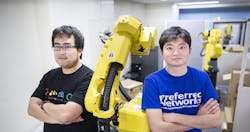This $2 Billion AI Startup Aims to Teach Factory Robots to Think
Japan’s Preferred Networks Inc. has only one publicly available product, a whimsical application that uses artificial intelligence to automate the coloring of manga cartoons.
Yet the four-year-old firm has become Japan’s most valuable startup, with a venture capital funding that priced it at more than $2 billion, according to people familiar with the matter. Toyota Motor Corp., its biggest backer, handed over $110 million on a bet its algorithms will help them compete with Google in driverless cars. Last February, Prime Minister Shinzo Abe posed for pictures with the firm’s two young founders at his office, where they were awarded a prize for promising new ventures.
What sets Preferred Networks apart from the hundreds of other AI startups is its ties to Japan’s manufacturing might. Deep learning algorithms depend on data and the startup is plugging into some of the rarest anywhere. Its deals with Toyota and Fanuc Corp., the world’s biggest maker of industrial robots, give it access to the world’s top factories. While Google used its search engine to become an AI superpower, and Facebook Inc. mined its social network, Preferred Networks has an opportunity to analyze and potentially improve how just about everything is made.
“There is so much promise for deep learning in manufacturing,” said Yutaka Matsuo, a computer scientist at the University of Tokyo and president of Japan Deep Learning Association.
Founders Daisuke Okanohara and Toru Nishikawa met at the University of Tokyo, where they studied computer science in the early 2000s. Okanohara, an engineer whose work on something called context-aware text classification won him a “supercreator’ prize from the trade ministry in 2004, directs the firm’s research.
Nishikawa is the company’s president and pitchman. A cherubic 35-year-old, he says his fascination with computers started in elementary school. By 8th grade, he was lugging a primitive laptop the size of a car battery with him wherever he went. He told his teachers it was for note-taking, but he was actually writing programs.
Nishikawa spoke at his Tokyo headquarters, a drab collection of meeting rooms in an old office building more fitting of a down-on-its-luck insurance company. A handful of industrial robots, used for experiments, share the space with 140 or so engineers. The firm also has one of Japan’s most powerful supercomputers, though its exact location is secret.
“People are always coming up with beautiful new office plans for us,” Nishikawa said with a laugh. “But if I’m going to spend the money, I’d rather buy more computing clusters.”
In separate interviews, the founders talked about everything from their childhoods to their AI ambitions. One thing they wouldn’t discuss in detail was work for partners such as Toyota or Fanuc, for whom they’ve become like an outsourced AI research arm.
The idea of founding a business came while Nishikawa and Okanohara were working part-time at a biotech startup, writing software for genome sequencing. Their first venture, staffed with university friends, built a machine learning platform that could parse text faster than any application could generate it.
Then in 2012, scientific breakthroughs in deep learning made it possible for computers to reliably do things like understand speech and recognize objects, opening new realms where crunching data at speed would be useful. Nishikawa and Okanohara started Preferred Networks in 2014 and decided to focus on making industrial machines smarter, a shrewd decision because Japan still makes cutting-edge manufacturing equipment, and deep-pocketed AI superpowers like Google and Facebook haven’t carved up the territory.
“It’s an area where a Japanese company stands a chance of winning,” said Matsuo, the head of Japan Deep Learning Association.
One of the first people to buy into their vision was Fanuc Chairman Yoshiharu Inaba. A famously guarded businessman and a brilliant engineer who’d himself invented important tools for car manufacturing, Inaba agreed to meet Nishikawa and Okanohara in early 2015.
A one-hour conversation convinced him to give the two computer scientists $9 million, along with access to some of his most closely kept commercial secrets--vast streams of data generated by the thousands of robots on his factory lines.
“I felt we were on the same wavelength,” Inaba explained in a rare interview.
Toyota followed Inaba’s commitment four months later with $10 million of its own, adding another $100 million last August. Manufacturing powerhouse Hitachi Ltd., megabank Mizuho Financial Group Inc., and trading house Mitsui Co. became backers in December.
At the Las Vegas Consumer Electronics Show in 2016, a simple demonstration using toy cars showed some of what their technology can do. The demo had a half-dozen miniature Toyota Priuses set loose on an obstacle course. At first, the cars could hardly move without colliding. But after two hours of trial and error, they were zipping around as if they had professional drivers inside.
No human programmer had written instructions for them. Instead, they’d derived their own rules from experience, and the process was sped up by sharing it across a network (like learning from all of your friend’s mistakes if your friends could tell you everything).
At an expo in Japan a few months later, another demo showed how the tech might one day be used to turn factory robots into something closer to skilled craftsmen. Programming a Fanuc bin-picking robot to grab items out of a tangled mass might take a human engineer several days. Nishikawa and Okanohara showed that machines could teach themselves overnight. Working together, a team of eight could master the task in an hour. If thousands -- or millions -- were linked together, the learning would be exponentially faster.
“It takes 10 years to train a skilled machinist, and that knowledge can’t just be downloaded to another person” Fanuc’s Inaba explained. “But once you have a robot expert, you can multiply it infinitely.”
As impressive as that may sound, Nishikawa and Okanohara hinted at ambitions that would take them beyond being an AI subcontractor for Japan’s bluechips. This year, they plan to unveil their first standalone product since coming out with, PaintsChainer, their animation tool. The details are secret, of course.
“In this business,” Okanohara said, “if you’re not doing something that seems crazy to some people, you’ll never to do anything interesting.”
by Pavel Alpeyev
-- with assistance from Yuki Furukawa.
About the Author
Bloomberg
Licensed content from Bloomberg, copyright 2016.

